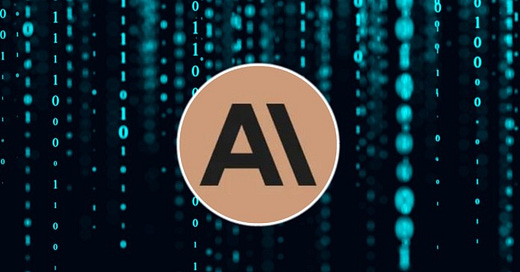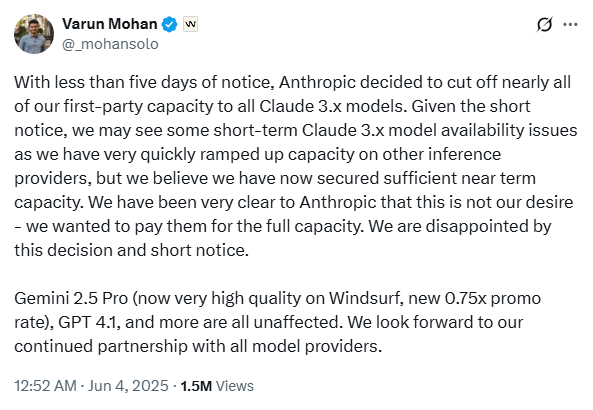Why Anthropic’s bet against Windsurf is a mistake
Anthropic's abrupt decision to cut Windsurf could potentially pave the way for competitors like Google amid market evolution.
Anthropic’s decision to cut off a major partner, Windsurf, from its Claude models could be a major, real-world test of a fundamental question in the AI industry: Does value lie in the foundational model or the application built on top of it?
In a move against its chief rival OpenAI, Anthropic has made a high-stakes bet that its model is king. It’s a bet they may lose.
In early June 2025, Anthropic informed Windsurf, a popular AI coding assistant, that it was cutting nearly all direct access to its Claude 3.x models. The change came with less than a week's notice, according to Windsurf. This forced the startup to scramble for capacity from other providers and push users towards a "bring-your-own-key" (BYOK) solution, which is often more expensive and complex for developers. Windsurf CEO Varun Mohan expressed his frustration, stating, “We are disappointed by this decision and short notice.”
The conflict puts two philosophies in direct opposition. Windsurf argues its value is independent of any single model. In a public statement, the company asserted, “The magic of Windsurf has never been limited to the model... The magic is in the deep contextual understanding of existing knowledge. The magic is in the intentional and thought-out [user experience].” This positions the application, with its specific workflows, integrations, and user interface, as the primary source of value for its customers.
If applications, not models, command user loyalty, then the market for AI models is becoming a commodity game. Windsurf’s actions support this view. The company immediately responded to the cutoff by launching a promotional rate for Google's Gemini 2.5 Pro, positioning it as "a strong alternative." This swift pivot suggests that for many developers, access to a range of high-quality, interchangeable models within their preferred tool is more important than access to one specific model. For Anthropic, this trend means it may have just handed a significant share of its developer market to a competitor.
However, Anthropic is betting on the opposite: that its Claude models are so superior that developers will follow them anywhere. There is some evidence for this perspective. One developer, a longtime Windsurf customer, recently switched to a competitor, Cursor, specifically to maintain easy access to the new Claude 4 model, which he said offered a "significant jump in capabilities" for his work, as reported by TechCrunch. This is the scenario Anthropic hopes for: that the model’s performance is the true moat, forcing users and applications to come to them.
Anthropic’s leadership has been transparent about the strategic, rather than purely commercial, nature of this decision. The move came shortly after reports that OpenAI, Anthropic's primary competitor, was in talks to acquire Windsurf. At a conference, Anthropic co-founder Jared Kaplan said, “I think it would be odd for us to be selling Claude to OpenAI.” This would position the action as a preemptive strike in the escalating rivalry between the two AI labs, intended to weaken a key asset before it fell into enemy hands.
This strategic block created a difficult trade-off. By continuing to supply Windsurf post-acquisition, Anthropic risked OpenAI collecting valuable input-output data from Claude to train its own future models. However, by cutting Windsurf off, Anthropic loses an important distribution channel and access to a massive stream of developer interactions, the very data it needs to refine and improve its own models. The company had to decide if protecting its model's current secrets from OpenAI was worth sacrificing the data needed for its future development.
While Anthropic's defensive logic is clear, the move feels like an unforced error in an evolving market. The company prioritized protecting its current technology over maintaining market access and crucial feedback loops. In doing so, it created an opportunity not for itself, but for its other competitors. Google's Gemini models now have a prime opportunity to gain traction on one of the largest coding platforms. Ultimately, Anthropic may have successfully kept its data from OpenAI, but it may have also proven that in the new AI economy, the application—not the model—is the kingmaker.






Our company is a Windsurf customer and I can say that Anthropic's Sonnet is really better than the others. We hope Windsurf sorts this issue out with Anthropic, we really like Windsurf but we would have to move and find ways to cancel our contract if Sonnet is no longer available to us. It still is available to us, currently.